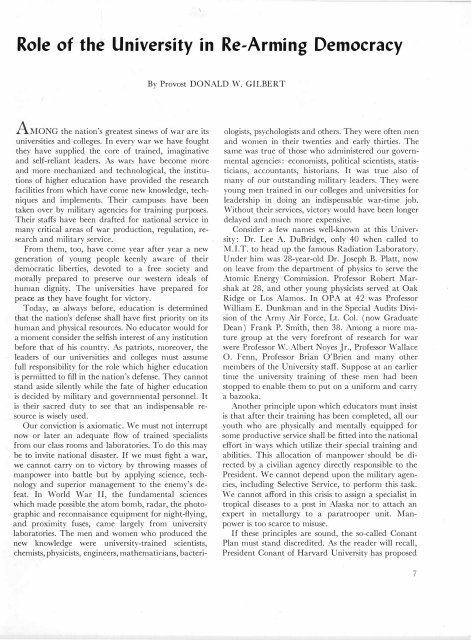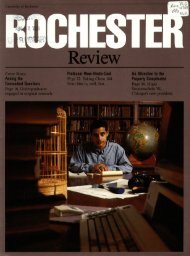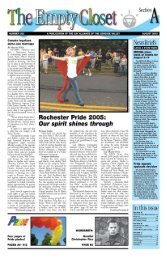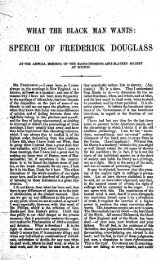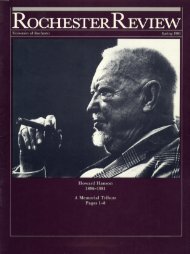Download PDF - River Campus Libraries - University of Rochester
Download PDF - River Campus Libraries - University of Rochester
Download PDF - River Campus Libraries - University of Rochester
Create successful ePaper yourself
Turn your PDF publications into a flip-book with our unique Google optimized e-Paper software.
Rol� <strong>of</strong> the <strong>University</strong> in Re-Arming Democracy<br />
A MONG the nation's greatest sinews <strong>of</strong> war are its<br />
universities and colleges. In every war we have fought<br />
they have supplied the core <strong>of</strong> trained, imaginative<br />
and self-reliant leaders. As war have become more<br />
and more mechanized and technological, the institutions<br />
<strong>of</strong> higher education have provided the research<br />
facilities from which have come new knowledge, techniques<br />
and implement . Their campuse have been<br />
taken over by military agencie for training purposes.<br />
Their staffs have been drafted for national service in<br />
many critical areas <strong>of</strong> war production, regulation, reearch<br />
and military service.<br />
From them, too, have come year after year a new<br />
generation <strong>of</strong> young people keenly aware <strong>of</strong> their<br />
democratic liberties, devoted to a free society and<br />
morally prepared to preserve our western ideals <strong>of</strong><br />
human dignity. The universities have prepared for<br />
peace as they have fought for victory.<br />
Today, a always before, education is deteJ.:mined<br />
that the nation's defense shall have first priority on its<br />
human and physical resources. No educator would for<br />
a moment consider the selfish interest <strong>of</strong> any institution<br />
before that <strong>of</strong> his country. As patriots, moreover, the<br />
leaders <strong>of</strong> our univer ities and colleges must assume<br />
full responsibility for the role which higher education<br />
is permitted to fill in the nation's defense. They cannot<br />
stand aside silently while the fate <strong>of</strong> higher education<br />
is decided by military and governmental personnel. It<br />
i their sacred duty to see that an indispensable resource<br />
is wisely used.<br />
Our conviction is axiomatic. We must not interrupt<br />
now or later an adequate flow <strong>of</strong> trained speciali ts<br />
from our class rooms and laboratories. To do this may<br />
be to invite national disaster. If we must fight a war,<br />
we cannot carry on to victory by throwing masses <strong>of</strong><br />
manpower into battle but by applying science, technology<br />
and superior management to the enemy's defeat.<br />
In World War II, the fundamental sciences<br />
which made possible the atom bomb, radar, the photographic<br />
and reconnaisance equipment for night-flying,<br />
and proximity fuses, came largely from university<br />
laboratories. The men and women who produced the<br />
new knowledge were university-trained scientists,<br />
chemists, physicists, engineers, mathematicians, bacteri-<br />
By Provost DONALD W. GILBERT<br />
ologists, psychologists and others. They were <strong>of</strong>ten men<br />
and women in their twenties and early thirties. The<br />
same was true <strong>of</strong> those who administered our governmental<br />
agencie : economists, political scientists, statisticians,<br />
accountants, historians. It wa true also <strong>of</strong><br />
many <strong>of</strong> our outstanding military leaders. They were<br />
young men trained in our colleges and universities for<br />
leadership in doing an indispensable war-time job.<br />
Without their ervices, victory would have been longer<br />
delayed and much more expensive.<br />
Consider a few names well-known at this <strong>University</strong>:<br />
Dr. Lee A. DuBridge, only 40 when called to<br />
M.LT. to head up the famous Radiation Laboratory.<br />
Under him was 28-year-old Dr. Joseph B. Platt, now<br />
on leave from the department <strong>of</strong> physics to serve the<br />
Atomic Energy Commi sion. Pr<strong>of</strong>essor Robert Marshak<br />
at 28, and other young physicists served at Oak<br />
Ridge or Los Alamos. In OPA at 42 was Pr<strong>of</strong>essor<br />
William E. Dunkman and in the Special Audits Division<br />
<strong>of</strong> the Army Air Force, Lt. Co1. (now Graduate<br />
Dean) Frank P. Smith, then 38. Among a more mature<br />
group at the very forefront <strong>of</strong> research for war<br />
were Pr<strong>of</strong>essor W. Albert Noyes Jr., Pr<strong>of</strong>essor Wallace<br />
O. Fenn, Pr<strong>of</strong>essor Brian O'Brien and many other<br />
members <strong>of</strong> the <strong>University</strong> staff. Suppose at an earlier<br />
time the university training <strong>of</strong> these men had been<br />
stopped to enable them to put on a uniform and carry<br />
a bazooka.<br />
Another principle upon which educators mu t insist<br />
is that after their training has been completed, all our<br />
youth who are physically and mentally equipped for<br />
some productive ervice shall be fitted into the national<br />
effort in ways which utilize their special training and<br />
a,bilities. This allocation <strong>of</strong> manpower should be directed<br />
by a civilian agency directly responsible to the<br />
President. We cannot depend upon the military agencies,<br />
including Selective Service, to perform this task.<br />
We cannot afford in this crisis to assign a specialist in<br />
tropical diseases to a post in Alaska nor to attach an<br />
expert in metallurgy to a paratrooper unit. Manpower<br />
is too scarce to misuse.<br />
If these principles are sound, the so-called Conant<br />
Plan must stand discredited. As the reader will recall,<br />
President Conant <strong>of</strong> Harvard <strong>University</strong> has proposed<br />
7


